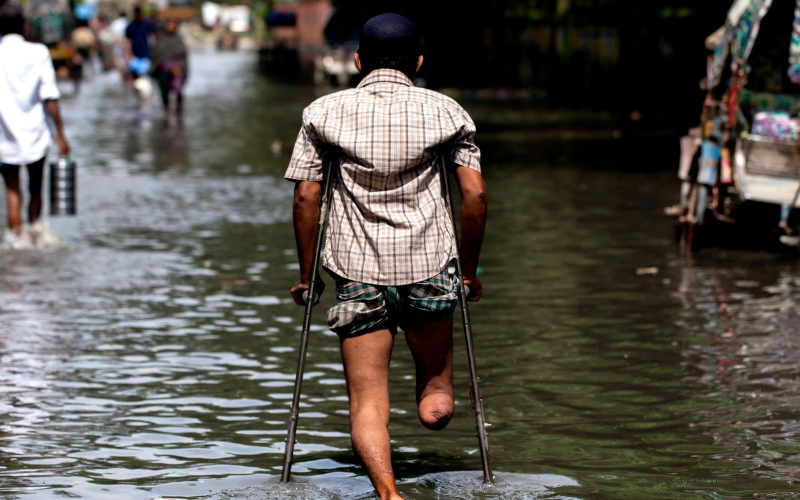The effects of climate change usually fall heavily on marginalized populations, including millions of persons with disabilities (PWDs) worldwide, especially those living in rural areas and poor communities. Almost 13 years ago, at COP16 of the UN Framework Convention on Climate Change (UNFCCC), the 2010 Cancun Agreements identified PWDs as disproportionally affected by the climate crisis and emphasized inclusion as an essential element of climate justice. Sadly, climate change professionals and policymakers tend to overlook these individuals more than any other demographic group.
Some of the challenges faced by persons with disabilities include a lack of targeted data and research on development and climate policies, social and political discrimination, and a lack of informative materials and strategic plans that can be accessed in formats such as braille and similar disability-friendly technologies used worldwide. Inaccessible websites and the unavailability of sign language interpreters are also common issues. This increases the already high vulnerability of PWDs, vis-à-vis the onset of climate change impacts that lead to increased food and water insecurity, reduced access to healthcare services and livelihoods, and decreased accessible infrastructure.
Moreover, the United Nations Convention on the Rights of Persons with Disabilities (CRPD), the main document to support disability inclusion and policies, emphasizes that individuals with disabilities are an “integral part of relevant strategies of sustainable development.”. Article 11 reinforces this statement in the context of climate change by requiring states to take “all necessary measures to ensure the protection and safety of persons with disabilities in situations of risk,” including “humanitarian emergencies and the occurrence of natural disasters.”.
The CRPD means to ensure the participation of persons with disabilities in the creation of climate adaptation and mitigation measures. Individuals with disabilities and Disabled People’s Organizations (DPOs) should be included as relevant stakeholders in the design, development, and implementation of these plans and policies.
Reliable data and research efforts
Data collection is a continuous challenge for disability justice and inclusion, especially when it comes to the intersectional matter of disability and climate change. The collection and promotion of reliable data on disability is essential to enabling national and international policymakers to address the issues that concern this part of the population in a more effective way.
Future research on environmental sociology is needed to further explore the relationship between disability justice and climate justice. On one hand, researchers should investigate the relationship between the perception of existing policy and its efficiency and perceptions of risk among disabled people; on the other. Besides the efforts of disability associations and think tanks, it is necessary to engage governments, civil society, and the private sector in promoting climate justice and inclusion for this vulnerable group through accurate research toward the implementation of new strategies and risk management projects.
Social and political discrimination
The name given to discrimination against persons with disabilities is Ableism, and it is considered a structural discrimination in most societies globally. Such discrimination prevents PWDs from enjoying the fulfillment of their human rights and citizenship.
Under a disability human rights approach, persons with disabilities are viewed as disproportionately experiencing environmental threats and natural disasters due to their exclusion from state laws, policies, and services available to their non-disabled peers. To ensure their rights and to overcome barriers, meaningful participation is required in policy development, priority setting, decision-making, and implementation activities. Representation matters!
The disability must be seen as a transversal matter in society. Understanding and connecting disability, vulnerability and environment, adaptative capacity and resilience, risk perception and management, information accessibility, policy, and action – can enable policymakers at various levels to better understand these unique climate-related challenges facing PWDs and other vulnerable communities.
In this light, it cannot but be expected that at the 2023 United Nations Climate Change Conference (COP28), a seat at the table will be reserved for disability climate inclusion and justice. This would be fulfilled by ensuring the participation of PWD / DPO representatives in the negotiations, motivating dialogue, to share their insights, articulating their needs, and securing climate justice solutions for themselves. Persons with disabilities need equitable access to information platforms and decision-making processes to enhance their knowledge and participation in climate mainstreaming conversations at every level.



